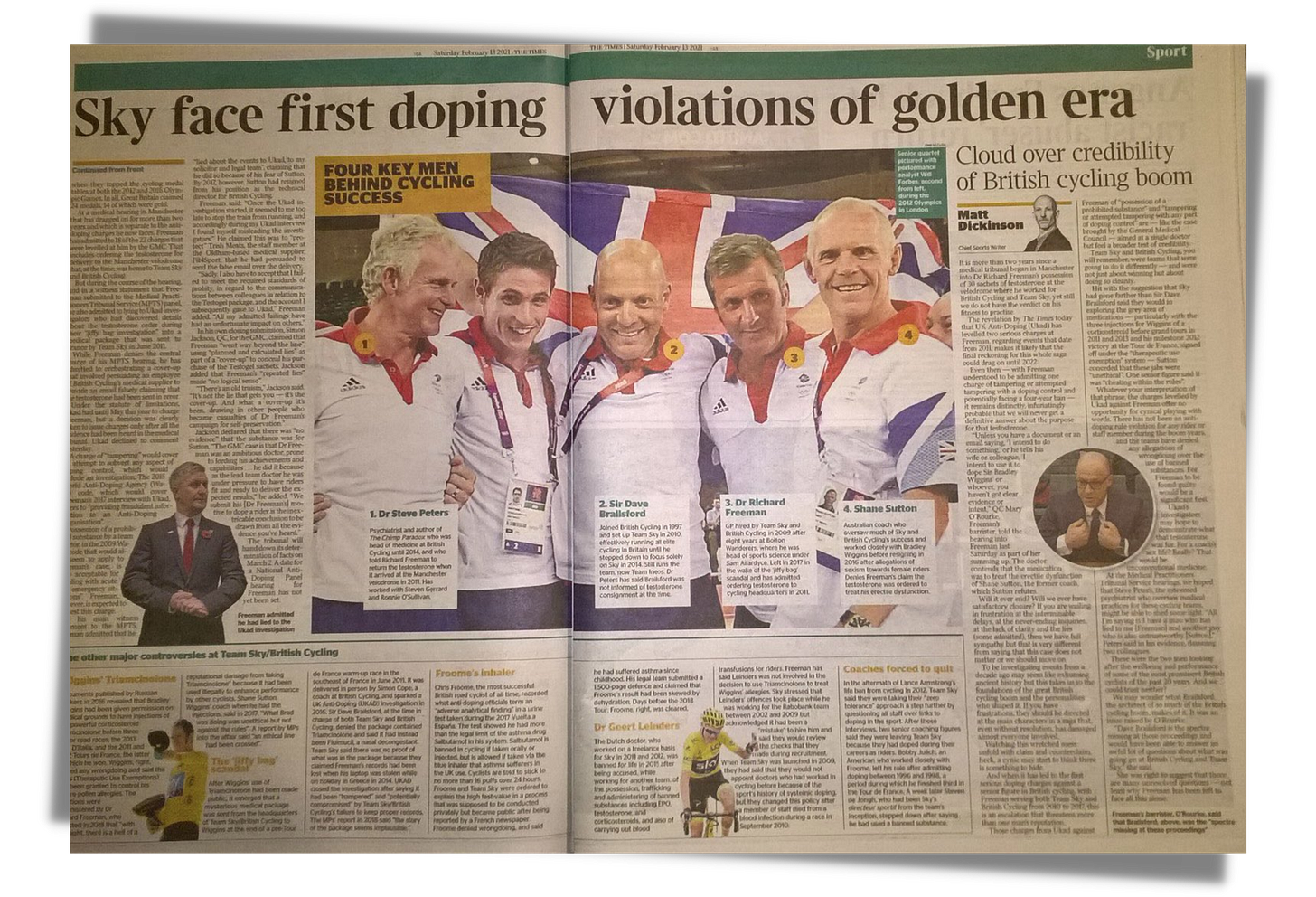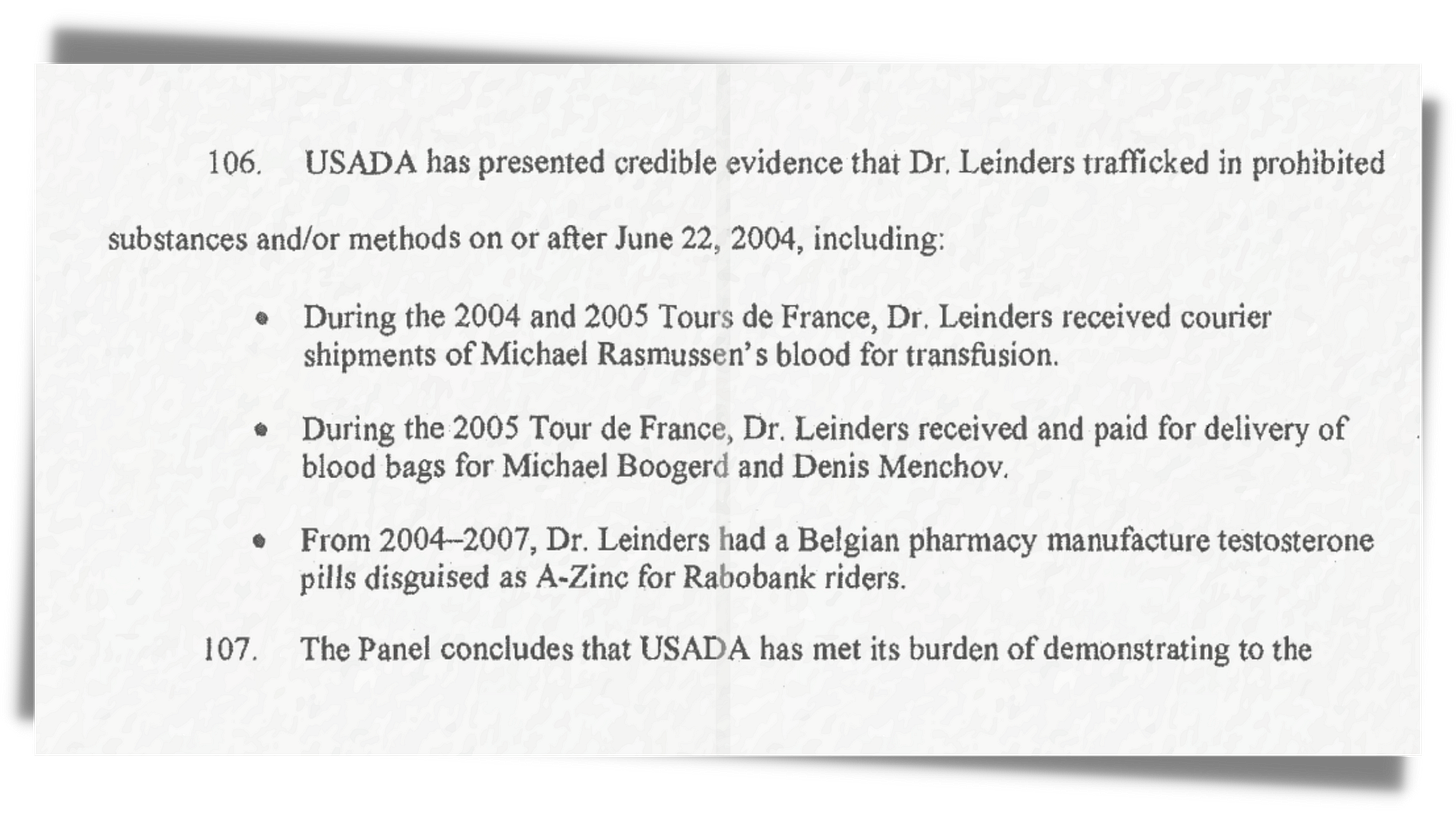Six British cyclists were investigated for banned testosterone use
The cyclists, licensed by British Cycling, were found to have elevated testosterone levels in the years before the British Cycling doctor ordered the same drug to the Manchester Velodrome.
It takes considerable time and effort to run this newsletter, and paid subscriptions help greatly. If you would like a group subscription for your organisation please reach out directly at honestsport@substack.com.
Thank you to those of you who have decided to subscribe already.
Help grow this newsletter by sharing it with friends, athletes or colleagues, particularly anti-doping officials, journalists or sports lawyers, who you think would find it useful or interesting. Thank you, Edmund!
Six British cyclists were formally investigated for the banned use of testosterone by anti-doping authorities, in the years before British Cycling hired doctor Richard Freeman, who had the same drug delivered to the Manchester Velodrome, Honest Sport has found.
In January last year, Freeman, who was Team Sky’s head doctor until 2017, failed to overturn the General Medical Council’s (GMC) decision to permanently strike him off the medical register. The GMC found Freeman guilty of ordering prohibited testosterone in 2011 and he was further sanctioned by UK Anti-Doping (UKAD) for four years.
The GMC said Freeman ordered testosterone to the British Cycling headquarters ‘knowing or believing’ it was for an unnamed rider. British Cycling is the main national governing body for cycle sports in Great Britain.
In May 2011, Freeman ordered 30 Testogel (testosterone) sachets from Fit4Sports Limited to the Manchester Velodrome. Then Freeman, once his order had been discovered, coaxed an employee at Fit4Sports into sending him an email stating that the package had been sent in error, and that the tesosterone had subsequently been returned and destroyed. This was untrue, Freeman never returned the testosterone and the email saying the drugs had been destroyed was sent five months after they had been delivered.

Freeman was the British Cycling doctor from 2009 until 2017.
Between 2004 and 2009, UK Sport, the body that governed anti-doping in this country at the time, detected elevated testosterone values in six British cyclists. If an athlete has a testosterone to epitestosterone value of greater than 4:1, then they are suspected of testosterone use. A further confirmatory test, known as an IRMS (Isotope-ratio mass spectrometry) test, is then required to establish that the athlete has taken the drug.
UK Sport followed correct procedures but was unable to confirm the presence of testosterone meaning the cyclists could have produced these levels naturally or the illegal testosterone had cleared their system by the time they were tested.
According to a former WADA-accredited laboratory official, at the time the samples were analysed, IRMS testing was in the order of ten times less sensitive than it is today. The analysis, also unlike today, was also only able to identify testosterone metabolites, rather than testosterone itself. In other words, if a cyclist had taken the drug, then the test would only be able to detect the bi-products that the testosterone was broken down into by the body.
Another British cyclist tested positive for Human chorionic gonadotropin (hCG) in 2005 but was deemed to have ‘No Case to Answer’.
The identity of these British cyclists, or whether they were a national or international-level competitor, remains unknown therefore there is no implication of wrongdoing on behalf of British Cycling as a whole, or the Great Britain Cycling team.
Doping was also rampant at the time across professional cycling, and the actions of any British cyclists from that era are not representative of the climate of cycling in Britain today.
However, it is also not known how many cyclists in the UK have been suspected of testosterone use in recent years because UKAD no longer publishes these data. Before UKAD was founded in 2009, UK Sport published every doping case, even if it was consequently closed, in a public database on its website.
Despite this deterioration in transparency, several British cyclists have been banned for testosterone possession and another cyclist tested positive for an anabolic agent while training at the Manchester Velodrome, the home of British Cycling.
In 2018, the cyclist Shaun Leonard was stopped by Swiss border force travelling to the 2018 Grand Fondo carrying 7 banned drugs. He was travelling with the cyclist John Vardy who competed at the event. Border force confiscated testosterone injections, testosterone gel, clenbuterol, amphetamine, modafinil, morphine and the masking agent furosemide from the car that belonged to Vardy.
Similarly, two years prior, the cyclist Ian Edmonds was banned for four years by UKAD after UK border force intercepted a package from India containing banned testosterone ampoules and nandrolone steroid tablets addressed to his home.
Coincidentally, an elite British cyclist, who was part of a training group controlled by the British Cycling head coach Shane Sutton, tested positive for trace levels of this same anabolic steroid nandrolone just months before testosterone was delivered to the Manchester Velodrome by Team Sky doctor Richard Freeman.
In March 2021, the Paralympic cyclist Erin McBride, who was part of British Cycling’s World-Class Programme, tested positive for the anabolic agent Ostarine after she was subject to an out-of-competition doping control at the Manchester Velodrome.
The Manchester Velodrome has been the home of British Cycling since 1994. It is also the location at which another Team Sky Doctor, who has administered testosterone to cyclists on a Dutch cycling team, was interviewed for the role.
In October 2010, Sir Dave Brailsford hired the Belgian doctor Geert Leinders on a consultancy basis to aid the team’s cyclists. Brailsford was British Cycling’s Head of Performance between 2002 and 2014.
In 2015, US Anti-Doping Agency (USADA) found that Leinders had a Belgian pharmacy manufacture testosterone pills disguised as zinc tablets for Team Rabobank cyclists between 2004 and 2007. Leinders was banned for life for doping offences by USADA.

Leinders, who worked for Team Sky in 2010 and 2011, was interviewed for the role by Dr. Steve Peters and Dr. Freeman at the Manchester Velodrome.
“We needed a doctor with experience and the guy I met (Leinders) appeared very ethical, very professional and very compassionate”, said Peters.
To hire Leinders, Sir Dave Brailsford amended Team Sky’s policy of not recruiting doctors with experience of professional cycling in an attempt to make a clean break with cycling’s doping past.
Brailsford later admitted, when news of Leinders involvement in doping broke, that it was a mistake to hire the doctor. While the hire was a PR disaster for Team Sky, there is no evidence that Leinders engaged in doping at Team Sky.
“The whole thing is my responsibility,” said Brailsford. “I will take that squarely on the chin. It’s something I regret, it’s a mistake.”
In response to this story British Cycling said, “all of the cases highlighted were investigated by UK Sport, as the national anti-doping authority at the time, and closed. There is no suggestion of any wrongdoing on the part of British Cycling, the Great Britain Cycling Team or any of the riders in question.”







